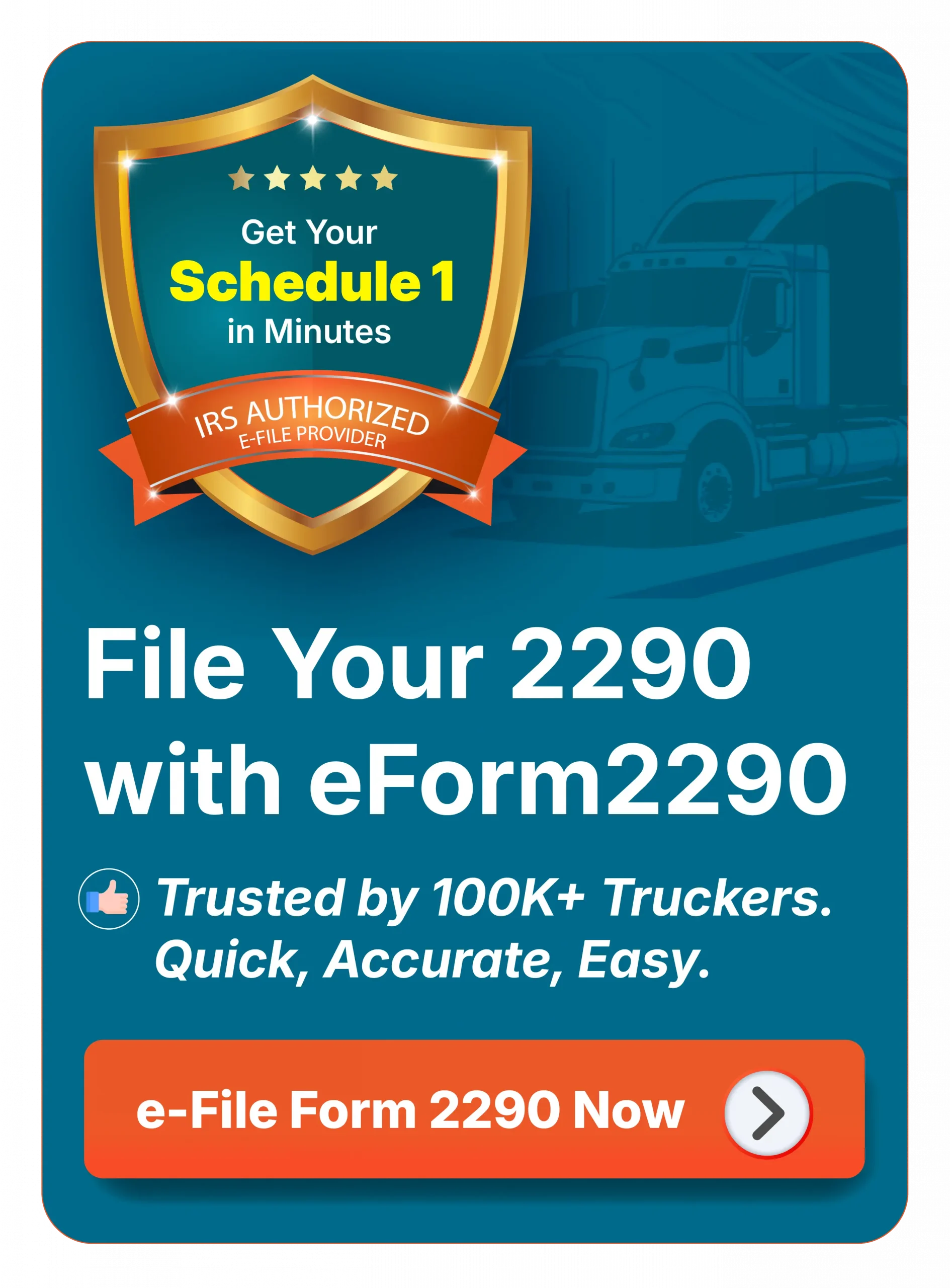IRS Form 2290 Late Filing Penalties
File form 2290 and pay the Heavy Vehicle Use Tax (HVUT) on time to avoid severe IRS penalties and interest charges. By staying compliant, you can avoid fines and keep your business running smoothly. File your 2290 today.
Form 2290, officially known as the Heavy Vehicle Use Tax, is a federal excise tax that applies to heavy motor vehicles with a taxable gross weight of 55,000 pounds or more. Owners and operators of these vehicles must file this form each year to stay compliant with IRS regulations and legally operate on public highways.
Filing Form 2290 accurately and on time is essential. Missed deadlines, delays, and providing incorrect information can lead to hefty penalties and interest charges. Sometimes, truck owners and operators can get so busy with regular operations that filing HVUT taxes takes a backseat. The IRS fine for late filing can become more than heavy penalties over time. So, it’s essential to be aware of the form 2290 due date and file on time to ensure uninterrupted business operations.
In this guide, we’ll walk you through everything you need to know about the penalties for late or incorrect form 2290 filings.
What are IRS form 2290 penalties?
Form 2290 penalties are fines applied by the IRS on heavy vehicle owners who fail to file or pay the Heavy Vehicle Use Tax (HVUT) by the annual deadline. The HVUT amount varies depending on the taxable gross weight of the vehicle and the pre-defined number of miles it covers during the tax period.
Penalties are calculated based on the unpaid tax amount and begin accruing the day after the filing deadline. If left unpaid, they continue to build up over time along with interest charges every month. Further delays can lead to escalating penalties, and in more serious cases, the IRS may take stronger action based on state laws and specific circumstances.
Quickly calculate your unpaid tax amount and avoid extra penalties with form 2290 tax calculator!


Why does the IRS fine for late filings?
The short answer is non- compliance.
When a business delays or fails to file its tax forms, it can create concerns about possible income concealment or tax evasion. The IRS generally understands minor delays, especially legitimate reasons carrying proof for missing a deadline. In such cases, the IRS may consider waiving penalties as well. However, long delays can lead to stricter penalties and invite scrutiny.
If a Form 2290 return is found to be false or fraudulent, the penalties become significantly more severe. Interest will also continue to accrue on any unpaid amounts, increasing the total balance due.
What are form 2290 penalty rates?
Failure-to-file penalty:
If you do not file form 2290 by the due date, the IRS imposes a failure-to-file penalty.- This penalty is 4.5% of the total unpaid tax amount for each month (or part of a month) the return is late, up to five months.
- The IRS will begin charging this penalty the day after the filing deadline, and it can grow to a maximum of 25% of the unpaid taxes.
Failure-to-pay penalty:
In addition to the failure-to-file penalty, a failure-to-pay penalty applies. This penalty is 0.5% of the total unpaid tax amount per month until the tax is paid in full.Interest charges:
The IRS also applies an interest rate of 0.54% per month on the unpaid tax amount. Combined, these penalties and interest can significantly increase your total tax liability. In total, late filers could end up paying around 5% of their total tax due per month, including all penalties and interest.Vehicle registration suspension:
In addition to federal penalties, many states may suspend a vehicle’s registration if proof of HVUT payment - form 2290 Schedule 1, is not submitted. This means, operating the vehicle on public highways would be considered illegal until the tax is settled and the filing is completed.Can you get relief from form 2290 penalties?
If you fail to file form 2290 or pay the HVUT on time, you may still be eligible for penalty relief by showing reasonable cause as mentioned before. To request relief, you must send a letter to the IRS explaining the circumstances that caused a delay in filing.
Important: Do not attach this explanation when you submit your form 2290.
If the IRS deems your reason valid, it may waive part or all of the penalties depending on the situation. However, if you have a history of late filings or prior penalties; your request is less likely to be approved.
First-time Penalty Abatement (FTA) for form 2290
In addition to reasonable cause relief, the IRS also offers a First-Time Penalty Abatement (FTA) program. This is applicable for first-time filers or taxpayers with a clean compliance record for the past three years. Eligible individuals can have certain penalties waived without needing to provide proof of reasonable cause.
Who qualifies for first-time penalty abatement?
Under this program, late filing penalties may be waived if you meet the following conditions:
- You are a first-time filer of form 2290 or have a clean compliance record for the past three years (excluding estimated tax penalties).
- You have filed all required tax returns or extensions for the previous three years.
- You have paid or made arrangements to pay any tax due.
- You have no prior significant penalty history.
If you meet these conditions, you may request an FTA after receiving a penalty notice from the IRS.
How to request an FTA for form 2290 late penalty
If eligible, you can request FTA by submitting a written or oral request after receiving a penalty notice. Keep in mind, the FTA program is a one-time opportunity and you cannot claim it again for future penalties.
Alternatively, you can file form 843 (Claim for Refund and Request for Abatement) to formally request a penalty waiver. This form requires basic information along with a valid explanation for the late filing or payment.
How to request an extension for filing IRS form 2290
If you miss the form 2290 deadline, the IRS generally assesses penalties. However, there are exceptions. Taxpayers who request an extension in advance are not penalized for late filings.
Similarly, if you are filing form 2290 to claim a refund for certain situations, the IRS will not impose penalties. But penalties may still apply if you are ineligible for a refund related exception.
If you need extra time to file IRS form 2290, you can request an extension before the due date by sending a written request to the IRS at:
Internal Revenue Service
7940 Kentucky Drive
Florence, KY 41042-2915
You will need to send a letter providing a full explanation for the cause of the delay. Generally, the IRS grants up to a six-month extension to file except for taxpayers residing abroad.
Note: An extension to file does not grant an extension to pay the taxes. If you require additional time to make your payment, you must submit a separate request specifically for a payment extension.
Whom to contact for assistance with form 2290 penalties
If you need help understanding penalties related to late filing or non-payment of IRS form 2290, there are multiple support options available based on how you filed your return.
For e-file userss
If you e-filed form 2290 through eForm2290.com, you can reach out to our customer support team for assistance and you will be guided for a possible resolution.
For paper filers
Taxpayers who filed a paper return can contact the IRS directly for penalty-related inquiries using the following numbers:
Within the United States (Toll-Free): 866-699-4096
From Canada or Mexico (Not Toll-Free): 859-669-5733
If you’ve received a penalty notice and need clarification or assistance with requesting first-time penalty abatement (FTA), reaching out to the IRS as soon as possible is recommended.


File form 2290 now and avoid further penalties
Filing your form 2290 and paying the full tax amount by August 31 is a non-negotiable to avoid costly penalties and interest charges. If you miss the deadline, it’s important to file your form 2290 online as soon as possible to minimize the penalties you may face.
Understanding form 2290 HVUT penalties is critical for all truck owners as knowing the penalty rates, relief options, and extension availability helps you get prepared for compliance and prevents financial stress.
Losing track of tax deadlines is understandable when managing busy schedules and regular operations, but late filing penalties can add up quickly. That’s why choosing eForm2290 as your trusted e-filing partner makes a big difference. We send timely reminders as your filing deadline approaches and offer value-added services and tools that make your tax filing experience fast, easy, secure, and hassle-free.
Stay ahead, stay compliant — file your form 2290 on time.
Frequently asked questions on form 2290 late penalties
1. What mistakes should I avoid when filing form 2290 to prevent penalties?
- Entering an incorrect VIN: Even a single error in your 17-character Vehicle Identification Number can lead to IRS penalties.
- Reporting the wrong gross weight: Filing with an inaccurate taxable gross weight could result in incorrect tax amount generation and trigger fines.
- Missing filing deadlines: Form 2290 is due by August 31st each year. Filing late results in heavy penalties and interest charges.
2. When is form 2290 due?
The deadline to file IRS form 2290 and pay the Heavy Vehicle Use Tax (HVUT) is August 31st for vehicles used on public highways in July. The HVUT tax year runs from July 1st to June 30th of the following year.
If you start using a taxable vehicle after July, you must file form 2290 by the last day of the month following the vehicle’s First Use Month (FUM).
3. What happens if you miss the form 2290 deadline?
If you miss the form 2290 filing deadline, you may face the following challenges and consequences:
- Penalties: The IRS will charge a penalty of 4.5% of the total tax due, assessed monthly for up to five months.
- Interest: Interest of 0.5% per month will be added to any unpaid tax amount.
- Registration issues: You may not be able to renew your vehicle registration without proof of filing form 2290.
- Additional fees: Continued failure to file can result in further fines and enforcement actions.
Compliance problems: Missing the deadline can negatively impact your compliance standing with the IRS and other agencies.
4. What penalty does a state face for HVUT non-compliance?
If a state fails to meet HVUT compliance requirements during a federal review, the Secretary of Transportation can withhold up to 25% of the state’s Interstate Maintenance funds.
5. How to ensure I file form 2290 correctly and on time and avoid penalties?
To file form 2290 accurately and avoid penalties, follow these tips:
- Mark the due date: Always remember that form 2290 is due by August 31st each year and plan ahead to avoid last-minute rush.
- Double-check all information: Verify important details like your Vehicle Identification Number (VIN) and tax calculations before submitting.
- E-file your return: E-filing form 2290 is quick, accurate, and recommended by the IRS too for faster processing; followed by receiving your stamped Schedule 1. Most e-file platforms such as eForm2290 also help catch common errors.
- Pay your tax immediately: If you owe taxes, pay them right away to avoid extra penalties and interest.
Maintain good records: Keep copies of your vehicle details and past form 2290 filings to make future submissions easier and error-free.
6. Will I be notified if I owe a penalty?
Yes, the IRS typically sends a notice detailing the amount you owe, including any penalties and interest.
7. What if I didn’t operate my vehicle during the tax period? Do I still get penalized?
If your vehicle wasn’t used on public highways during the tax period, you may qualify for a suspension or exemption of the 2290 tax. However, you must still file form 2290 and indicate suspension to avoid penalties.






